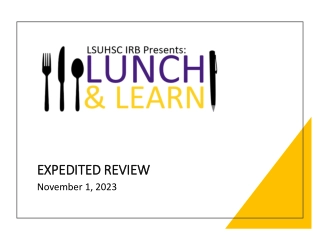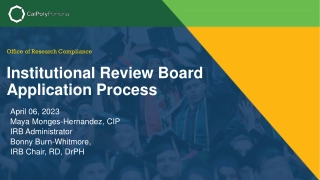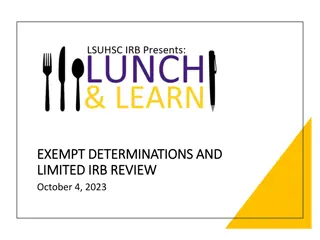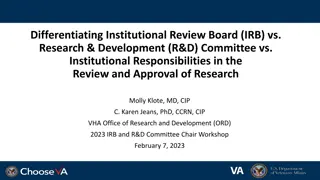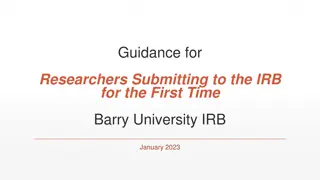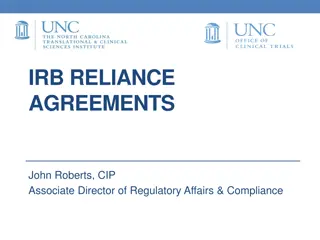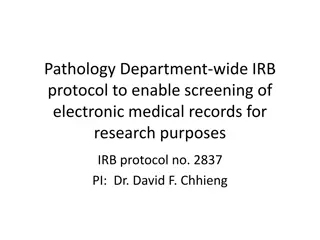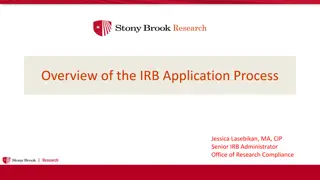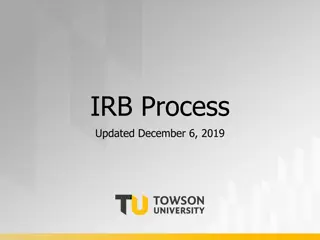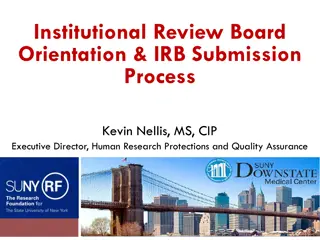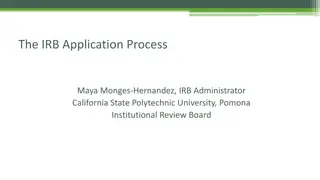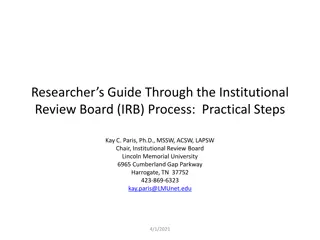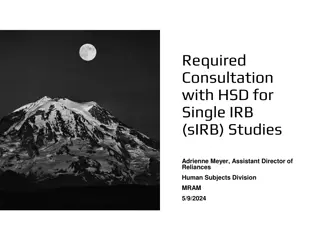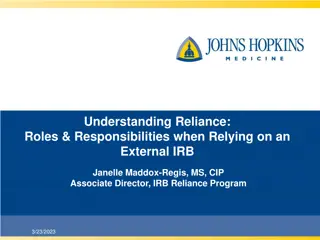Understanding Institutional Review Boards (IRB): A Comprehensive Overview
Institutional Review Boards (IRBs) play a critical role in reviewing, approving, and monitoring human subjects research to ensure their safety and rights are protected. This overview covers the functions of IRBs, different levels of review, types of studies, criteria for approval, and how IRBs determine approval. It also explains the concept of minimal risk, consent requirements, and additional safeguards for vulnerable subjects.
Download Presentation

Please find below an Image/Link to download the presentation.
The content on the website is provided AS IS for your information and personal use only. It may not be sold, licensed, or shared on other websites without obtaining consent from the author. Download presentation by click this link. If you encounter any issues during the download, it is possible that the publisher has removed the file from their server.
E N D
Presentation Transcript
NAVIGATING THE IRB Jessica L. Yoos, MA, CIP IRB Assistant Director Office of Regulatory Affairs
Agenda Our goal and mission / approach Levels of IRB review Types of studies that qualify Criteria for Approval Consent and HIPAA Authorization HSERA Submission Tips Questions
What is an Institutional Review Board (IRB)? An ethics committee What does the IRB do? Formally review, approve, and monitor human subjects research to ensure the safety, rights, and welfare of subjects are protected IRBs are also tasked with determining the degree and likelihood of risk Minimal risk: the probability and magnitude of harm or discomfort anticipated are not greater than those ordinarily encountered in daily life or during routine physical or psychological examinations or tests. Minimal Greater than minimal
Levels of IRB Review NHSR Exempt / Limited Review Expedited Review Convened Board Review
Types of Studies: Types of Studies: NHSR, exempt, and expedited Not Human Subjects Research (NHSR) Examples of Expedited Studies Exampled of Exempt Studies Not Research Example: Quality Improvement Educational Project Not involving HS Examples: Case study of 3 or fewer patients Using existing publicly available data (e.g., anyone can download from internet) Receiving de-identified data or specimens where no link exists with identifiers Research involving cadavers Surveys/ interviews/ focus groups with with adults adults collecting non-sensitive data Benign behavioral interventions with Secondary research with existing, non-sensitive data or specimens Limited datasets from data registries or research studies Chart reviews Research with drug and device products that is exempt from FDA IND & IDE regulations Risks must be minimal Risks must be minimal Non-invasive collection of saliva, hair, nails, teeth, skin swab, sputum, etc. Venous or fingerstick blood collection considering frequency, amount, and subject Collection of data via non- invasive means (e.g., MRI without contrast, EEG, ECG, pulse ox, etc.) with adults adults
How does the IRB determine approval? Risks to subjects are minimized Risks are reasonable in relation to benefits Consent will be sought / documented Criteria for Approval Additional safeguards for vulnerable subjects Equitable subject selection Adequate protections to protect privacy and confidentiality
Consent and HIPAA Authorization Informed Consent/ HIPAA Administering a drug or device for research purposes Administering a clinical or behavioral intervention Alteration of IC/ HIPAA Must be minimal risk as determined by the IRB Participants given option to opt out because intervention is being implemented across a whole hospital or health system Waiver of Interviews, Focus Groups, Surveys, Questionnaires Prospective chart review plus phone survey Non-invasive collection of such as saliva, teeth, etc. Documentation of IC Waiver of IC and HIPAA Retrospective chart review Collection of leftover tissue usually discarded
Best Practices Review Review Submission Submission Guidance on our Guidance on our website website Utilize our Utilize our template template protocols & protocols & consent forms consent forms Don t repeat Don t repeat. Don't Don't leave blank space in HSERA. . Refer to Section # in Protocol Make sure everyone has taken their CITI training training Tell us what you Tell us what you want to do want to do CITI Use simple Use simple language in language in consents and consents and application application Give yourself Give yourself enough time & enough time & don't rush don't rush Provide rationale Provide rationale
Best Practices Continued Complex and/or Greater than Minimal Risk Research Utilize a protocol template from our website Clearly delineate research aspects from usual care: required by the protocol = research Consider whether independent safety monitoring is appropriate based on the risk If administering a drug or device product, the study can only be reviewed at the expedited level if: The protocol qualifies for an exemption from FDA IND and IDE regulations, AND The protocol is minimal risk
Other Educational Options Come to IRB Office Hours Come to IRB Office Hours with specific questions: Thursdays 10am-12pm Join as a convened board IRB member Join as a convened board IRB member for more experience! Commitment Details: Full time: 8 meetings a year, or Alternate: attend meetings as needed (e.g., 3-4 mtgs per year), or Serve as a consultant reviewer Flexible attendance options: tele-conference or video-conference Benefits Improved knowledge of IRB processes facilitates IRB submissions Exposure to new research topics, designs and technologies in various fields New networking opportunities with faculty, staff, and students in related fields Interested? Email me: jessyoos@upenn.edu

 undefined
undefined

